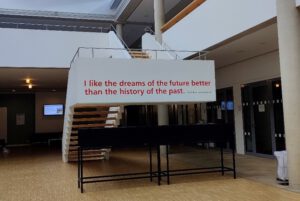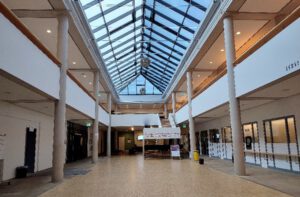 When I started studying at Leuphana University Lüneburg, I eventually went into the library and couldn’t help notice the quote by Thomas Jefferson on the library staircase. The words and possible meanings were resonating with me. By studying here, I imagined, I can create a better future. No matter how dark the past is, we can make the future brighter.
When I started studying at Leuphana University Lüneburg, I eventually went into the library and couldn’t help notice the quote by Thomas Jefferson on the library staircase. The words and possible meanings were resonating with me. By studying here, I imagined, I can create a better future. No matter how dark the past is, we can make the future brighter.
Now that a few semesters have passed, I recently started to question the quote. By only looking into the future, don’t we neglect the past? What kind of quote is this to put in a library, which basically consists of works of the past? Is there a deeper meaning to why a quote by Thomas Jefferson was chosen? And is it suitable to put his words on our walls? What else is there to know about Jefferson and his dreams for the future?
To analyze the quote properly, I think we need to know more about Thomas Jefferson and the context in which the quote appeared. Jefferson was the third President of the United States (1801–1809) and one of its founders. He was also a philosopher and architect. The quote originates from a letter he wrote to John Adams (second President of the United States) in 1816. Looking back at his life, Jefferson remarks that
bigotry is the disease of ignorance, of morbid minds; enthusiasm of the free and buoyant. education & free discussion are the antidotes of both. we are destined to be a barrier against the returns of ignorance and barbarism. old Europe will have to lean on our shoulders, and to hobble along by our side, under the monkish trammels of priests & kings, as she can. what a Colossus shall we be when the Southern continent comes up to our mark! what a stand will it secure as an alliance for the reason & freedom of the globe! I like the dreams of the future better than the history of the past.
Looking at this statement, Jefferson doesn’t only dream of education and freedom, he also dreams of the power and the superiority of the American continent. His dreams have come true in a way, since German universities have now also adapted the American Bachelor/Master system. Then again, he couldn’t possibly have imagined that everyone would have the opportunity to attend these universities. Given that Jefferson was a slaveholder and that he fought against the Indigenous populations of America, his ‘enlightened’ worldview crumbles – at least from today’s perspective. In his times, the Age of Enlightenment meant a new and revolutionary political system where you would elect your leader. Though his idea of freedom and equality meant that only white, property-owning men deserved political participation.
You might ask why a Jeffersonian quote was placed in our library. Of course, a university creates the future by creating knowledge. But interestingly enough, there’s more to it. Leuphana’s campus consists of former military barracks called Scharnhorst Kaserne. Through the reform of the Bundeswehr, Germany’s army, this area was free for repurposing and the barracks were converted into a university in the 1990s. The goal was to find a balance between the military past and the university future. The original barracks were constructed in 1930s during the Nazi era, with infantry units positioned there. Now, these former barracks have turned into seminar rooms and offices.
 The library used to house tanks – there was a lot that had to be changed. The foyer alludes to the temple of Athena, using pillars and a triangle-shaped roof. This supposedly shows how knowledge is worshipped here. At some places in the library, traces of the military past remain to create visibility and remembrance.
The library used to house tanks – there was a lot that had to be changed. The foyer alludes to the temple of Athena, using pillars and a triangle-shaped roof. This supposedly shows how knowledge is worshipped here. At some places in the library, traces of the military past remain to create visibility and remembrance.
The plan was to create a campus fashioned after American campuses, a concept called the academic village. In the center, there would be a library instead of a church, an idea from the University of Virginia (built between 1817 and 1826), designed by Thomas Jefferson. Apparently, he wanted to put knowledge at the center of his world order.
I like this idea of a campus village, a place to generate knowledge and interact with other students. The library is the go-to place for researching and writing term papers. Knowledge is power, they say. If that’s the case, it only makes sense to create a temple for it. I like to look at it this way: You need to learn from the past. And you have to question what you’re looking at. Looking deeper into the quote was only possible by researching its origin – partly in the library.
Of course, we can’t neglect the past. Maybe that’s what Jefferson wanted to do, but I don’t think it’s what this quote means in the context of the library. A lot of precautions were taken to assure that the military past of the Leuphana campus wouldn’t be forgotten. Our generation might not be guilty of the Nazi crimes, but we bear the responsibility to prevent them from happening again. Therefore, this quote inspires me to learn from the past and to create a better future.
Thomas Jefferson was a man of his time. His ideals were not the same as the ones we value today. Maybe he stood at the beginning of a development that brought us to where we are today.
7,070 Total Views, 15 Views Today






